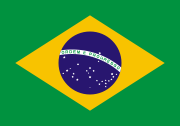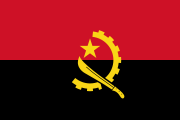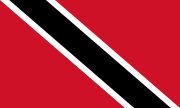FIFA Club World Cup
 The FIFA Club World Cup Trophy, which is awarded to the world champions. |
|
| Founded | 2000 |
|---|---|
| Region | International (FIFA) |
| Number of teams | 7 |
| Current champions | FC Barcelona |
| Website | Club World Cup |
The FIFA Club World Cup, formerly known as the FIFA Club World Championship, is a football competition contested between the champion clubs from all six continental confederations, although, since 2007, the champions of Oceania must play a qualifying play-off against the champion club of the host country.
The first competition took place in Brazil in January 2000. It was intended by FIFA to be a replacement for the Intercontinental Cup (also known as the Toyota Cup), which was contested annually in Yokohama, Japan by the champions of Europe via the Champions League and South America via the Copa Libertadores. Following a hiatus, the competition was re-branded and reintroduced in 2005 and has been the sole intercontinental club championship since then.
Contents |
History
The 2000 FIFA Club World Championship, held in Brazil, consisted of eight qualifiers: the six continental champions, the Intercontinental Champions and the host nation champions. The tournament was somewhat controversial, most notably in England where Manchester United had to withdraw from the national cup competition, the FA Cup, in order to compete. The launch of the competition was understood by some to be part of a struggle between FIFA and UEFA, who were competing for control of international club football: the existing Intercontinental Cup fell outside of FIFA's jurisdiction.[1] The final was competed between the two Brazilian sides and the winner was Corinthians from São Paulo that became the first Club World Champion recognized by FIFA.[2]
The second competition was penciled in for Spain in 2001, to feature 12 teams. This was canceled owing to a combination of factors, most importantly the collapse of FIFA's marketing partner ISL. It was then intended to hold the event in 2003, but this also failed to happen. FIFA eventually agreed to terms with the Intercontinental Cup to merge the two competitions. The final Intercontinental Cup was the 2004 edition, with the first installment of the relaunched Club World Championship held in Japan between December 11 and December 18, 2005.
The 2005 relaunched version was shorter than the previous World Championship, reducing the problem of scheduling the tournament around the different club seasons across each continent. It contained just the six reigning continental champions, with the CONMEBOL and UEFA champions receiving byes to the semi-finals of the tournament.
The competition was then renamed as FIFA Club World Cup for the 2006 event, which was held annually in Japan until 2008. The 2009 and 2010 events will be hosted by the United Arab Emirates. For the 2007 FIFA Club World Cup, a play-off match between the OFC champions and the host-nation champions for entry into the quarter-final stage was introduced in order to increase home interest in the tournament. The reintroduction of the match for fifth place for the 2008 competition also prompted an increase in prize money by US$500,000 to a total of US$16.5 million. The winners took away $5 million, second-placed team received $4 million, the third-placed team $2.5 million, the fourth-placed team $2 million, the fifth-placed team $1.5 million, the sixth-placed team $1 million and the seventh-placed team received $500,000.[3]
In February 2008 a FIFA Club World Cup Champions Badge was introduced, featuring an image of the trophy, which the reigning champion is entitled to display on its kit until the final of the next championship. Initially, all four previous champions were allowed to wear the badge until the 2008 final[4], where Manchester United gained the sole right to wear the badge by winning the trophy.
The teams with the most appearances in the competition are Al-Ahly of Egypt and Pachuca of Mexico, which have been involved in three out of the five tournaments held - 2005, 2006 and 2008 for Al-Ahly and 2007, 2008 and 2010 for Pachuca.
Champions
| Year | Final | Third Place | Venue | ||||
|---|---|---|---|---|---|---|---|
| Winner | Score | Runner-up | Third place | Score | Fourth place | ||
| 2000 Details |
Corinthians |
0 – 0 (a.e.t.) (4 – 3 pens.) |
Necaxa |
1 – 1 (a.e.t.) (4 – 3 pens.) |
Maracanã Stadium, Rio de Janeiro |
||
| 2005 Details |
São Paulo |
1 – 0 | Saprissa |
3 – 2 | International Stadium, Yokohama |
||
| 2006 Details |
Internacional |
1 – 0 | Al-Ahly |
2 – 1 | International Stadium, Yokohama |
||
| 2007 Details |
Milan |
4 – 2 | Urawa Red Diamonds |
2 – 2 (4 – 2 pens.) |
International Stadium, Yokohama |
||
| 2008 Details |
Manchester United |
1 – 0 | Gamba Osaka |
1 – 0 | International Stadium, Yokohama |
||
| 2009 Details |
Barcelona |
2 – 1 (a.e.t.) | Pohang Steelers |
1 – 1 (4 – 3 pens.) |
Sheikh Zayed Stadium, Abu Dhabi |
||
| 2010 Details |
Sheikh Zayed Stadium, Abu Dhabi |
||||||
Honours
| Year | Golden Ball | Silver Ball | Bronze Ball | Top Goalscorer | Fair Play Award | Winning Manager |
|---|---|---|---|---|---|---|
| 2000 | ||||||
| 2005 | ||||||
| 2006 | ||||||
| 2007 | ||||||
| 2008 | ||||||
| 2009 |
Top goalscorers
- 4 goals
 Denilson (
Denilson ( Pohang Steelers)
Pohang Steelers)
- 3 goals
 Wayne Rooney (
Wayne Rooney ( Manchester United)
Manchester United) Nicolas Anelka (
Nicolas Anelka ( Real Madrid)
Real Madrid) Romário (
Romário ( Vasco da Gama)
Vasco da Gama) Mohamed Aboutrika (
Mohamed Aboutrika ( Al-Ahly)
Al-Ahly) Washington (
Washington ( Urawa Red Diamonds)
Urawa Red Diamonds) Flávio (
Flávio ( Al-Ahly)
Al-Ahly)
Only one player has scored goals for more than one club in the history of the FIFA Club World Cup:
 Dwight Yorke (1 goal for
Dwight Yorke (1 goal for  Manchester United and 1 goal for
Manchester United and 1 goal for  Sydney FC)
Sydney FC)
In 2009, Barcelona player Pedro scored at the tournament, becoming the first person to score in six different club competitions in a single season.
Performances by team
| Team | Winners | Runners-Up | Third | Fourth |
|---|---|---|---|---|
| 1 (2009) | 1 (2006) | |||
| 1 (2000) | ||||
| 1 (2005) | ||||
| 1 (2006) | ||||
| 1 (2007) | ||||
| 1 (2008) | ||||
| 1 (2000) | ||||
| 1 (2005) | ||||
| 1 (2007) | ||||
| 1 (2008) | ||||
| 1 (2009) | ||||
| 1 (2000) | ||||
| 1 (2005) | ||||
| 1 (2006) | ||||
| 1 (2007) | ||||
| 1 (2008) | ||||
| 1 (2009) | ||||
| 1 (2000) | ||||
| 1 (2005) | ||||
| 1 (2006) | ||||
| 1 (2007) | ||||
| 1 (2008) | ||||
| 1 (2009) |
Performances by country
| Nation | Winner | Runners-Up | Third | Fourth |
|---|---|---|---|---|
| 3 (2000, 2005, 2006) | 1 (2000) | |||
| 1 (2009) | 1 (2006) | 1 (2000) | ||
| 1 (2008) | 1 (2005) | |||
| 1 (2007) | ||||
| 2 (2007, 2009) | ||||
| 1 (2008) | ||||
| 2 (2007, 2008) | ||||
| 1 (2000) | 3 (2006, 2008, 2009) | |||
| 1 (2005) | ||||
| 1 (2006) | ||||
| 1 (2009) | ||||
| 1 (2005) | ||||
| 1 (2007) |
Performances by confederation
| Cofederation | Winners | Runner-up | Third | Fourth |
|---|---|---|---|---|
| CONMEBOL | 3 (2000, 2005, 2006) | 4 (2000, 2007, 2008, 2009) | ||
| UEFA | 3 (2007, 2008, 2009) | 2 (2005, 2006) | 1 (2000) | |
| AFC | 3 (2007, 2008, 2009) | 1 (2005) | ||
| CONCACAF | 2 (2000, 2005) | 3 (2006, 2008, 2009) | ||
| CAF | 1 (2006) | 1 (2007) | ||
| OFC |
Prize money
For each team, the winners received $5 million, the second-placed team takes $4 million, the third-placed team $2.5 million, the fourth-placed team $2 million, the fifth-placed team $1.5 million, the sixth-placed team $1 million and the seventh-placed team received $500,000.
Sponsorship
The cup's main sponsor is Toyota.
See also
- FIFA Club World Cup participants
- International club competition records
- List of world club champions
- FIFA Women's Club World Cup
References
- ↑ "Football's global power struggle". BBC News. 1999-12-20. http://news.bbc.co.uk/1/hi/special_report/1999/12/99/world_club_championship/570444.stm. Retrieved 2010-05-02.
- ↑ [1]
- ↑ "Organising committee approves tournament format with reintroduction of match for fifth place". FIFA. 2008-03-12. http://www.fifa.com/clubworldcup/organisation/media/newsid=711059.html. Retrieved 2008-03-13.
- ↑ "FIFA awards special 'Club World Champion' badge to AC Milan". FIFA. 2008-02-07. http://www.fifa.com/clubworldcup/organisation/media/newsid=687173.html. Retrieved 2008-02-08.
External links
- FIFA Club World Cup official site
- Sports Illustrated coverage of the FIFA World Club Championship
- (Italian) History of FIFA Club World Cup
- (Italian) Stats of FIFA Club World Cup
|
|||||||||||||||||
|
||||||||
|
||||||||||||||||||||||||||
|
|||||||||||
|
||||||||
|
||||||||||||||||||||||||||
